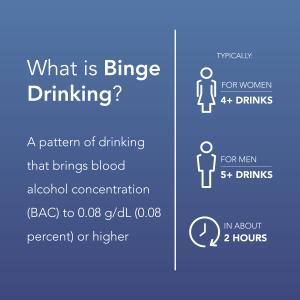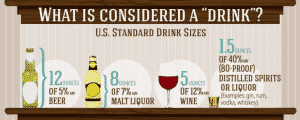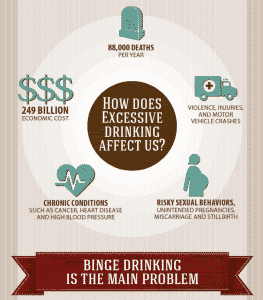Binge drinking may seem like typical behavior to some, but this habit can eventually lead to issues such as alcoholism. Noticing the signs of binge drinking and finding treatment is key to avoid long-term problems related to alcohol abuse.
Many people find themselves having a drink or two on a specific day of the week. What once started as a casual time turns into full-blown hour-by-hour drinking for 2-4 days straight.
If this scenario sounds familiar to you–you may be someone prone to binge drinking; although some people can easily take a few sips here and then at social gatherings, some individuals are prone to having habitual large consumption of alcoholic drinks. To help you understand if you fit the criteria, it is important to define binge drinking.
What is Binge and Heavy Drinking? Binge Drinking

According to the Centers for Disease Control and Prevention (CDC), binge drinking is the most common, yet most deadly alcohol habit in the United States. While there are several ways of defining this, the CDC defines this as a pattern of drinking where a person brings their blood alcohol concentration (BAC) to 0.08 g/dL or higher.
Wondering what binge drinking looks like? this typically happens when men consume 5 or more drinks or women consume 4 or more drinks in about 2 hours. Most people who binge drink do not have a severe alcohol use disorder, but this drinking pattern can be a gateway to alcohol abuse when left untreated.
Here are other sobering facts related to binge drinking, reported by the 2019 National Survey on Drug Use and Health:
- 24% of people in the United States, aged 12 and older, reported binge drinking.
- 4.9% of people aged 12 to 17 reported binge drinking.
- 27.7% of people aged 18 to 22 reported binge drinking.
- 10% of people aged 65 and over reported binge drinking.
- 1 of 4 women reported binge drinking.
Because of how common binge drinking is, it is also essential to educate people about its potential effects and how it ties with having an alcohol addiction.
Heavy Drinking
As opposed to binge drinking, heavy drinking is defined as it follows:
- For men, consuming more than 4 drinks on any day or more than 14 drinks per week.
- For women, consuming more than 3 drinks on any day or more than 7 drinks per week.
Like binge drinking, heavy drinkers increse the risk of suffering alcohol use disorder.
Binge Drinking and Alcohol Use Disorder
Perhaps the next question to be answered is if binge drinking leads to alcohol use disorder. For every type of addiction, there are internal and external factors that lead to it; in the case of excessively consuming alcoholic beverages, one major factor that can lead to addiction is the high concentration of blood alcohol level which can affect the brain.
A study found funded by the National Institutes of Health found that long-term alcohol consumption affects the activity of neurotransmitters in the brain. According to researchers, the introduction of high levels of alcohol affects the delicate balance of brain chemicals that regulate the way we think, process emotions, and behave. The disruption of this balance leads to the development of cravings when one ceases to drink, which can further grow into a full-blown addiction.
Other factors about binge drinking that lead to alcohol use disorder are:
- Frequency of binge episodes: The more often binge episodes occur, the greater that alcohol affects the brain.
- Type of drinks being consumed: Hard drinks (those which have higher alcohol proof) are more likely to cause dependency than light alcoholic drinks.
- Genetic susceptibility: Some binge drinkers are more prone to developing an addiction due to inherited traits.
- Environmental triggers: Chronic stress, relationship problems, financial stress, peer pressure, and other outside influences can cause more binge drinking episodes that lead to addiction.
- Mental health disorders: mental disorders such as depression or anxiety can lead to a increased alcohol consumption.

It is easy to dwell on the thought that not all binge drinkers become dependent on alcohol. However, it is important to note that for every individual who binges on alcohol, there is a risk of developing this addiction. The amount of risk to develop alcohol use disorder depends on each individual; if you are adamant about avoiding alcohol use disorder, it is best to nip the issue from the bud by controlling binge drinking as well.
Effects and Dangers of Binge Drinking
There is a reason why the CDC labeled binge drinking as one of the “deadliest yet common” habits in Americans. There are many health, economic, and personal concerns that arise from binge drinking which not only affects the individual but also the people around them. What are some binge drinking risks everyone should know about?
Health problems

There are various health concerns related to alcohol binge drinking, but these are some that truly stand out:
Alcohol withdrawal syndrome
Since binge drinkers often skip drinking alcohol for a couple of days then splurge on another period, there is a risk of having alcohol withdrawal syndrome. This is a condition where a person who has been drinking heavily stops drinking suddenly.
As a result, an individual may experience seizures and loss of consciousness, vomiting, confusion, and hallucinations.. These cases are considered a medical emergency and can be fatal with proper medical attention.
Cardiovascular problems
Excessive amounts of alcohol can also lead to cardiovascular problems such as heart attack and stroke. According to the American Stroke Association, drinking too much alcohol can raise blood pressure, leading to increased risk of stroke. Increased blood pressure (hypertension) can also lead to heart problems and increase the risk of having a heart attack.
Binge drinkers who are more advanced in age are at higher risk for heart attacks or strokes.
Mental health disorders
Alcohol frequently also contributes to mental health disorders, such as anxiety or depression. Numerous studies have shown that alcohol affects the neurotransmitter balance in the brain and can dampen one’s ability to experience positive emotions in a non-intoxicated state.
For example, a person who binges on alcohol may be used to feeling happy only when consuming large amounts; without these binge episodes, they may feel depression and anxiety. As a result, mental health disorders often go hand-in-hand with alcohol abuse.
Additionally, mental disorders can trigger individuals to engage in binge drinking; people may find themselves in situations like these in their attempts to ‘self-medicate’ their mental health disorder. However, this may prove to be more harmful, as binge drinking can cause dependency, which can worsen mental health over time. This scenario is known as Co-ocurring Disorder.
Brain Damage
Verbal and Learning Skills
Alcohol is a known sedative that causes motor issues related to speech, thus, intoxicated individuals often have slurred speech. Additionally, alcohol can contribute to neurodegenerative diseases including chronic memory loss and cognitive impairments that persist even after one has stopped drinking. There is some evidence to suggest that chronic heavy drinking can also lead to Alzheimer’s disease over time.
Decision-Making
Long-term alcohol use is also associated with reduced brain white matter. The white matter in the brain is involved with brain cell communication. When this part of the brain is decreased or damaged, people can have impaired decision-making skills, which can result in poor impulse control or and difficulty performing daily tasks.
Other health risks of binge drinking include:
- Congenital malformations can occur when drinking is done during pregnancy.
- Occupational and vehicular accidents related to binge drinking.
- Behavioral changes.
Economic concerns
Aside from physical and mental health disorders, there is also an impact on one’s economic well-being. Binge drinkers spend about $1.90 a drink on average, and when this amount is quadrupled for every episode, it can lead to them spending overs $1,000 annually. For lower-income households, this can leave a huge dent in the money they bring in every year and cause additional stress.
Not to mention, developing alcoholism can potentially increase the amount of spending an individual has on their daily dose of drinks.
Personal concerns
Personal concerns arise from health and economic issues related to binge drinking. For example, relationship problems come when a family member or a partner disagrees with an individual’s drinking habits.
The lack of money due to an alcohol habit may also cause stress within the household. Additionally, being under the influence of alcohol leads to poor performance on daily responsibilities, leading to work problems and failure to accomplish former routines.
To fully avoid these health, economic, and personal issues related to binge drinking, self-medicating should be avoided. It is ideal to seek professional treatment as soon as possible so that binge drinkers can avoid having an alcohol addiction.
How to Quit Binge Drinking
The first step in treating alcohol binge drinking is to undergo an assessment to check if you have developed a dependency. Alcohol use disorder (AUD) is diagnosed with several criteria that describe your drinking habits. When these characteristics are confirmed in yourself or a loved one, a custom-fit program will be prescribed to help in binge drinking and alcohol dependency.
Binge Drinking Assessment
There will be physical and psychological tests to evaluate your condition. Physical tests may include taking blood or urine samples and answering questionnaires about your current health. Psychological tests include answering questions about your mental health background and other related concerns.
In these assessments, it is important, to be honest about your drinking habits and explaining your triggers for having binge episodes, because this will affect your course of treatment. If you are confirmed to have an alcohol dependency, you may be encouraged to go through a medical detox to help improve the outcomes of your treatment. Otherwise, you may proceed to other binge drinking treatment options available in most high-quality rehab centers.
Binge Drinking Treatment
Those with a binge drinking problem combined with alcohol dependency may undergo several evidence-based programs such as:
- 12-Step Treatment
- Psychotherapies
- Holistic Treatment
- Faith-Based Treatment
- SMART Recovery
These are treatment options backed up by clinical evidence to help overcome alcohol use disorder. Not all treatment programs are suited for everyone, and this is why the best rehab facilities offer multiple options to help patients explore the type of approach that is suited for their needs.
As for those who fit the criteria for binge drinking but haven’t developed an alcohol dependency, the main mode of treatment is by managing episode triggers. The goals of treatment may include the following:
- Finding ways to avoid or overcome binge drinking triggers.
- Provide counseling to process the psychological causes of binge drinking.
- Inclusion in support groups for people going through the same journey.
These goals can be met by using the same programs mentioned above, or through a combination of one-on-one counseling, group counseling, holistic therapies, psychotherapies, or faith-based approaches.
Common Signs of Binge Drinking
How does one differentiate binge drinking from other alcohol-related problems? Below are some of the common signs you can watch out for yourself or your loved ones.
- Frequent and intermittent drinking: A binge drinker is someone who may opt to drink heavily at least once a month in heavy amounts. The term ‘binge’ comes from the habit of abstaining on some days and indulging heavily on some days.
- Making excuses for drinking: Excuses include feeling stressed out, frequently having good time with people, or minimizing the actual amount of alcohol one consumes.
- Risky and dangerous actions: The lack of impulse control when under the influence of alcohol can be problematic. Intoxicated individuals will engage in more risky behavior such as drunk driving, sex with multiple partners, or aggressive behavior with others.
- Memory problems: Intoxication can also cause problems in one’s ability to retain long-term and short-term memory. Often called “blackouts,” periods of a memory loss are common in binge drinkers.
Signs and Symptoms of Binge Drinking
Some signs and symptoms one should take note of if binge drinking is a valid concern are:
- Having more than 4-5 drinks every 2 hours at least once a month during episodes.
- Forgetting what happened while drinking.
- Feelings of guilt and shame during drinking episodes.
- Thoughts that one should reduce the amount of alcohol consumed after an episode.
- Commonly drinking more than what is originally intended.
- Others expressing concern of your drinking habits.
- Neglecting responsibilities due to drinking episodes.
- Frequent headaches, dizziness, and fatigue related to alcohol use.
- Memory problems related to alcohol use.
- Irritability and agitation when one is unable to drink.
If you have any or all of these signs and symptoms, it is advisable to get professional help as soon as possible.
Binge Drinking: Taking It Seriously Matters
Binge drinking may sound “not as bad” as other types of substance use disorders, but its effects can be catastrophic when left on its own. Taking this destructive habit seriously and promptly finding treatment options should be a priority when your goal is to avoid alcohol addiction and dependency, which can be fatal.
Sources
Medical disclaimer:
Sunshine Behavioral Health strives to help people who are facing substance abuse, addiction, mental health disorders, or a combination of these conditions. It does this by providing compassionate care and evidence-based content that addresses health, treatment, and recovery.
Licensed medical professionals review material we publish on our site. The material is not a substitute for qualified medical diagnoses, treatment, or advice. It should not be used to replace the suggestions of your personal physician or other health care professionals.








